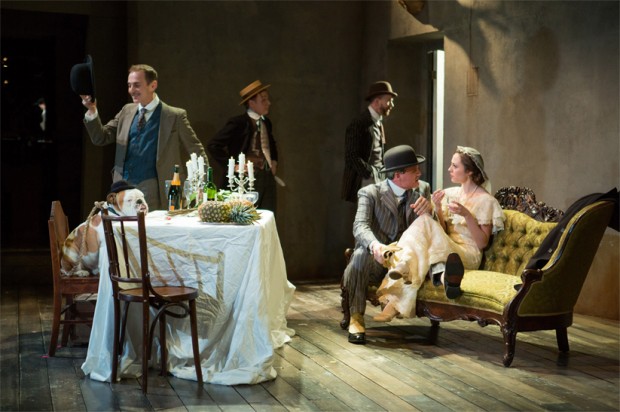You have no items in your cart. Want to get some nice things?
Go shopping
Life was bleak for the poor of Victorian London, but for the poor of Victorian London as imagined by Bertolt Brecht, life is downright hellish. Rape, murder and arson as daily occurrences; human charity – when it it won – is effected only when the poor don mawkish disguises (the “blind man”, the “nervous twitcher”) to elicit sympathy from their richers, if not betters.
For Polly Peachum (Laura Osnes) – virtuous, idealistic, and more than a little naïve – such a world is hardly teeming with possibilities. She can either join up in the family business of her grasping parents (F. Murray Abraham alongside The Good Wife’s Mary Beth Peil), outfitting down-and-out stragglers in beggars’ garb in exchange for a cut of the takings, or become a gangster’s moll and common-law wife to the infamous, inexplicably magnetic Macheath – yes, that’s “Mack the Knife” (Michael Park). Being young and foolish, Polly impulsively chooses the latter: giving rise to a power play between the elder Mr. Peachum and the nefarious Macheath that soon expands to include a brother full of Macheath’s conquests, the Commissioner of Police, and Queen Victoria herself.
What a shame, therefore, that the primary battlers for Polly’s soul and virtue are so much less interesting than Polly herself. As Macheath, Michael Park exhibits a certain gravitas but less charisma: it’s difficult to see him as an inveterate womanizer, let along the kind of dangerous criminal whose truly horrifying deeds are recited in “Mack the Knife” (sung with creepy-crawly sinuousness by an otherwise criminally underused John Kelly). He’s handsome enough, charming enough, and has a pleasant baritone, but as the king of thieves, he’s a cipher.
So too F. Murray Abraham, as Peachum, who seems to be playing the beleagued sitcom father to Michael Park’s only vaguely unwelcome son-in-law, shrugging and sighing his way through scenes that could have been truly chilling. (Mary Beth Peil, as his addled but no less wicked wife, embraces the slight camp of the role with far more glee.)
Luckily, the women in this production fare far better. As Polly, Laura Osnes is chillingly knowing: her cynical solo “Barbara Song” betrays a keen, even agonizing self-awareness of Macheath’s thrall; even in the midst of celebrating her mock marriage, we learn, she knows exactly what kind of man she has married. The disconnect between the classically virtuous ingenue and the weary eroticism Osnes so splendidly carries off is the closest to Brechtian this Threepenny gets, and it’s among the production’s more compelling moments.
No less stunning is Sally Murphy as Macheath’s ex- (and current) lover, the prostitute Jenny. Given the “Pirate Jenny” solo originally granted to Polly, Murphy’s “Pirate Jenny” is a slow, savage exercise in table-turning: evincing a hatred of her many oppressions that encompasses not only Macheath but indeed all of mankind. When either Murphy or Osnes is onstage, the production’s energy rises a thousandfold: it’s their story, rather than that of either man in their lives, that becomes all the more compelling. (Indeed, Park is at his best dueting with Murphy in the “Tango” number towards the close of Act One.)
Visually, Martha Clarke has created and expertly compelling world. There’s no “sexy” decadence of the Kurt Weill derelict here – with few exceptions, the beggars and prostitutes are appropriately costumed (by Donna Zakowska, seemingly taking inspiration from Egon Schiele); little about their world is glamorized. Christopher Akerlind’s lighting provides the perfect interplay of light and shadows in a world characterized by its darkness.
Unfortunately, the tempered energy of Park and Abraham makes for a far more sedate Threepenny than the violence of Brecht’s lyrics or Weill’s music would suggest: this, like the best-known jazzy Bobby Darin rendition of “Mack the Knife”, is at times a too-toothless Threepenny – a particular shame, given how compelling both Osnes’ and Murphy’s characters are. Would that we had a “Pirate Jenny” musical instead.
The Threepenny Opera continues at the Linda Gross Theater until May 11. See the Atlantic Theatre Company website for more information.

About Tara Isabella Burton
Tara Isabella Burton's work has appeared or is forthcoming in Arc, The Dr TJ Eckleburg Review, Guernica, and more. In 2012 she received the Shiva Naipaul Memorial Prize for travel writing. She is represented by the Philip G. Spitzer Literary Agency of New York; her first novel is currently on submission.




